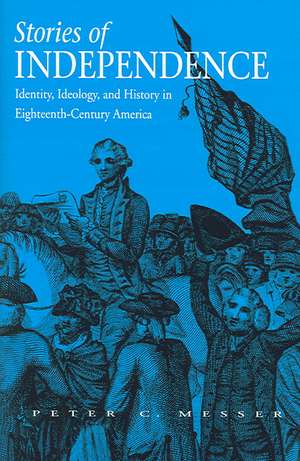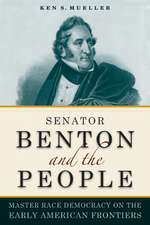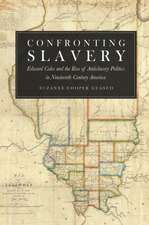Stories of Independence: Identity, Ideology, and History in Eighteenth-Century America
Autor Peter C. Messeren Limba Engleză Hardback – 31 oct 2005
Peter C. Messer demonstrates that a strong sense of a shared past transformed British subjects into American citizens. He traces the emergence of distinctively American attitudes about society, politics, and government through the written history of the American experience. Stories of Independence argues that the way early Americans wrote about their own history—from colonial times, to the heady days of the Revolution, to the uneasy decades following independence—helped shape the future of this young nation.
Differences between American colonists and the British government became increasingly contentious over the course of the eighteenth century as distinctive American identities emerged among the colonists. Grounded in common values and the shared experiences of creating communities in a new world, these identities would eventually liberate Americans to declare their independence and experiment with new forms of government.
During the colonial period, provincial historians celebrated the autonomous origins and local institutions of their communities as a way of arguing for greater independence from Great Britain. Imperial historians, on the other hand, stressed allegiance to the mother country and the English institutions that continued to sustain them. When relations with Britain reached a crisis, these visions of provincial pride and imperial loyalty came into open and irreconcilable conflict. The resulting debate produced not only a declaration of independence but a new political order grounded on the provincial vision of the origins and progress of America.
When the political turmoil of the 1780s and 1790s threatened to fragment the new republic, historians turned to the provincial vision of history to fashion a past for their nation from which they could create a unifying national identity. Their stories of the drive for independence and the founding of the United States helped both cement and limit the innovations in political thought produced by their provincial and revolutionary predecessors.
Differences between American colonists and the British government became increasingly contentious over the course of the eighteenth century as distinctive American identities emerged among the colonists. Grounded in common values and the shared experiences of creating communities in a new world, these identities would eventually liberate Americans to declare their independence and experiment with new forms of government.
During the colonial period, provincial historians celebrated the autonomous origins and local institutions of their communities as a way of arguing for greater independence from Great Britain. Imperial historians, on the other hand, stressed allegiance to the mother country and the English institutions that continued to sustain them. When relations with Britain reached a crisis, these visions of provincial pride and imperial loyalty came into open and irreconcilable conflict. The resulting debate produced not only a declaration of independence but a new political order grounded on the provincial vision of the origins and progress of America.
When the political turmoil of the 1780s and 1790s threatened to fragment the new republic, historians turned to the provincial vision of history to fashion a past for their nation from which they could create a unifying national identity. Their stories of the drive for independence and the founding of the United States helped both cement and limit the innovations in political thought produced by their provincial and revolutionary predecessors.
Preț: 397.89 lei
Nou
Puncte Express: 597
Preț estimativ în valută:
76.15€ • 79.20$ • 62.86£
76.15€ • 79.20$ • 62.86£
Carte tipărită la comandă
Livrare economică 14-28 aprilie
Preluare comenzi: 021 569.72.76
Specificații
ISBN-13: 9780875803500
ISBN-10: 0875803504
Pagini: 268
Dimensiuni: 152 x 229 x 25 mm
Greutate: 0.57 kg
Ediția:1
Editura: Northern Illinois University Press
Colecția Northern Illinois University Press
ISBN-10: 0875803504
Pagini: 268
Dimensiuni: 152 x 229 x 25 mm
Greutate: 0.57 kg
Ediția:1
Editura: Northern Illinois University Press
Colecția Northern Illinois University Press
Recenzii
"An excellent book ... meticulously researched and methodically organized."—American Historical Review
"[A] penetrating study ... welcome for its original insights into the Revolution's ideological origins, its ambiguous legacy, and, ... the centrality of cultural politics to American political culture. Among the best recent studies of republican ideology."—The Journal of American History
"Original and erudite ... an important step in understanding the rise and development of a unique mode of American historical thought as well as its contribution to the formation of social and poltical behavior in America."—William and Mary Quarterly
"[A] penetrating study ... welcome for its original insights into the Revolution's ideological origins, its ambiguous legacy, and, ... the centrality of cultural politics to American political culture. Among the best recent studies of republican ideology."—The Journal of American History
"Original and erudite ... an important step in understanding the rise and development of a unique mode of American historical thought as well as its contribution to the formation of social and poltical behavior in America."—William and Mary Quarterly
Cuprins
Table of ContentsIntroduction—Identity, Ideology, and History
PART I—Colonial Precedents
1 Autonomous Communities within an Empire
2 Dissent and the Alternative that Was Lost
PART II—Revolutionary Implications
3 A Revolution in Defense of History
PART III—Early National Consequences
4 Securing Republican Foundations
5 Political Compromises and Cultural Imperatives
Epilogue—Liberal Denouement
Appendix 1—Chronology of American Histories
Appendix 2—Biographical Sketches of the Historians
Notes
Works Cited
Index
PART I—Colonial Precedents
1 Autonomous Communities within an Empire
2 Dissent and the Alternative that Was Lost
PART II—Revolutionary Implications
3 A Revolution in Defense of History
PART III—Early National Consequences
4 Securing Republican Foundations
5 Political Compromises and Cultural Imperatives
Epilogue—Liberal Denouement
Appendix 1—Chronology of American Histories
Appendix 2—Biographical Sketches of the Historians
Notes
Works Cited
Index
Descriere
Peter C. Messer demonstrates that a strong sense of a shared past transformed British subjects into American citizens. He traces the emergence of distinctively American attitudes about society, politics, and government through the written history of the American experience. Stories of Independence argues that the way early Americans wrote about their own history—from colonial times, to the heady days of the Revolution, to the uneasy decades following independence—helped shape the future of this young nation.
Differences between American colonists and the British government became increasingly contentious over the course of the eighteenth century as distinctive American identities emerged among the colonists. Grounded in common values and the shared experiences of creating communities in a new world, these identities would eventually liberate Americans to declare their independence and experiment with new forms of government.
During the colonial period, provincial historians celebrated the autonomous origins and local institutions of their communities as a way of arguing for greater independence from Great Britain. Imperial historians, on the other hand, stressed allegiance to the mother country and the English institutions that continued to sustain them. When relations with Britain reached a crisis, these visions of provincial pride and imperial loyalty came into open and irreconcilable conflict. The resulting debate produced not only a declaration of independence but a new political order grounded on the provincial vision of the origins and progress of America.
When the political turmoil of the 1780s and 1790s threatened to fragment the new republic, historians turned to the provincial vision of history to fashion a past for their nation from which they could create a unifying national identity. Their stories of the drive for independence and the founding of the United States helped both cement and limit the innovations in political thought produced by their provincial and revolutionary predecessors.
Differences between American colonists and the British government became increasingly contentious over the course of the eighteenth century as distinctive American identities emerged among the colonists. Grounded in common values and the shared experiences of creating communities in a new world, these identities would eventually liberate Americans to declare their independence and experiment with new forms of government.
During the colonial period, provincial historians celebrated the autonomous origins and local institutions of their communities as a way of arguing for greater independence from Great Britain. Imperial historians, on the other hand, stressed allegiance to the mother country and the English institutions that continued to sustain them. When relations with Britain reached a crisis, these visions of provincial pride and imperial loyalty came into open and irreconcilable conflict. The resulting debate produced not only a declaration of independence but a new political order grounded on the provincial vision of the origins and progress of America.
When the political turmoil of the 1780s and 1790s threatened to fragment the new republic, historians turned to the provincial vision of history to fashion a past for their nation from which they could create a unifying national identity. Their stories of the drive for independence and the founding of the United States helped both cement and limit the innovations in political thought produced by their provincial and revolutionary predecessors.











